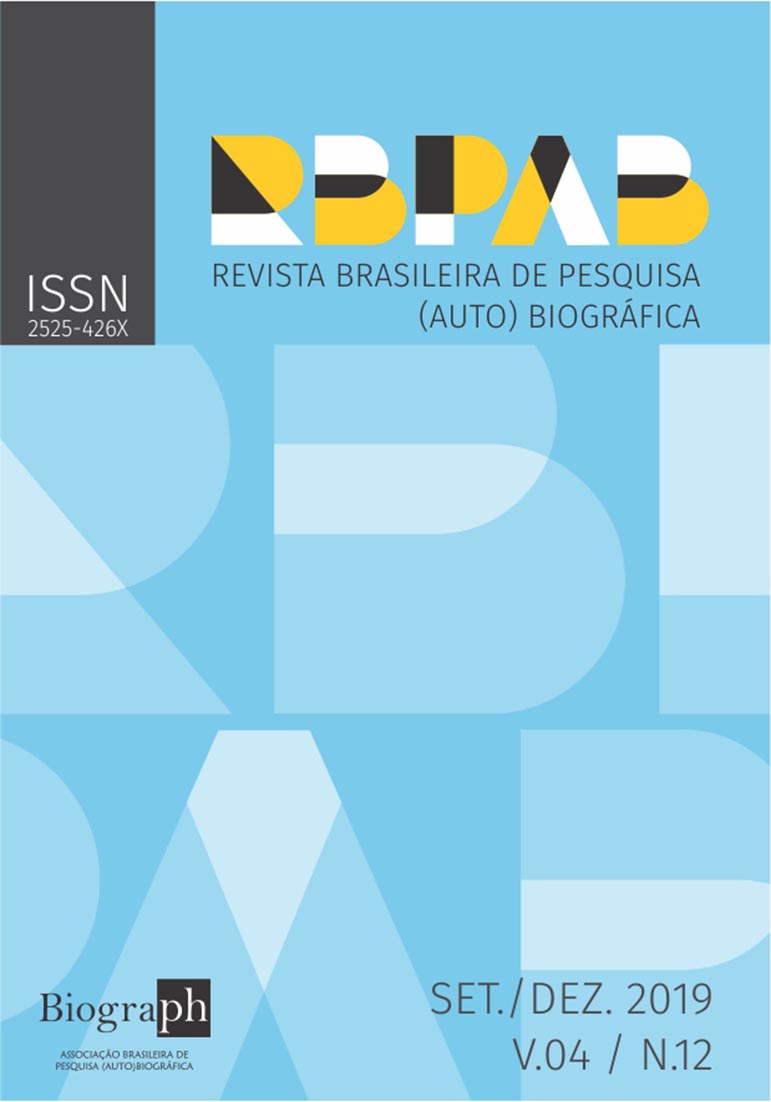Narrative-based research and psychosocial practices in Japan
DOI:
https://doi.org/10.31892/rbpab2525-426X.2019.v4.n12.p849-863Palavras-chave:
Narrative, Semiotic activity, Boundary zone, Life story, Psychosocial supportResumo
The aim of this study was to investigate how the narrative mode of thinking creates therapeutic meaning in psychosocial practice in Japan. The main question of research guide was how the narrative mode of thinking can facilitate reconstructing the self. The idea of the Japanese psychologist Hayao Kawai was reviewed. It was indicated that his idea was examined according to the movement of the narrative turn in the field of the practice of human science. The methodology of this study was based on the analysis on the clinical vignette in the field of psychological counseling and the social support for delinquents by group music therapy. Next, the personal life story of a Teacher was analyzed in this study. The point of analysis was focused on the act of meaning making and the semiotic activity of the narrative process. In this point, the Japanese cultural concept of ma was examined, the boundary transitive zone. The concluding remark was that the semiotic activity of meaning was generated and forms the dynamism of tension around opposites. Personal narratives were created in the boundary transitive zone.
Downloads
Referências
BOTZ-BORNSTEIN, Thorsten. Place and Dream: Japan and the virtual. Amsterdam: Editions Rodopi, 2004.
BRUNER, Jerome. S. Acts of Meaning. Cambridge, MA: Harvard University Press, 1990.
BUBER, Martin. Ich und Du. Leipzig: Insel Verlag, 1923.
CHARON, Rita. Narrative Medicine: Honoring the Stories of Illness. New York: Oxford University Press, 2008.
JOSEPHS, Ingrid E., VALSINER, Jaan & SURGAN, Seth E., The process of meaning construction: Dissecting the flow of semiotic activity. In: Brandtstätder, Jochen & Lerner, RICHARD M. (Eds.), Action & Self Development. Thousand Oaks, CA.: Sage. 1999. p. 257-282.
KAWAI, Hayao. Jung Shinrigaku Nyumon [An Introduction to Jungian Psychology]. Tokyo: Baifukan, 1971.
KAWAI, Hayao. Monogatari to Kagaku [Narrative and Science]. Collected works of Hayao Kawai. v. 12. Tokyo:Iwanamisyoten, 1995.
KEATS, John. The Letters of John Keats, ed. by H E Rollins, 2 vols (Cambridge: Cambridge University Press, 1958), i, p. 193–4. December 1817.
KIMURA, Bin. Kankei tositeno Jiko [The self as relationships]. Tokyo: Misuzushobo, 2005.
KLEINMAN, Arthur. The Illness Narratives. New York: Basic Books, 1988.
MATSUMOTO, Kakuko. Meaning construction and its transformation in narratives about “Important Music of Oneself”: Introduction of music therapy into group counseling for juvenile delinquent. Japanese Bulletin of Arts Therapy, Tokyo: Japanese Association of Arts Therapy, 36-1/2, p. 95-103, October 2005.
MATSUMOTO, Kakuko. Meaning construction and its transformation in narratives about music with a personal meaning., In SATO, Tatsuya., MORI, Naohisa., & VALSINER, Jaan(ed.)Making of The Future: The Trajectory Equifinality Approach in Culture Psychology. Charlotte, NC: Information Age Publishing, pp. 88-103, 2016.
MORIOKA, Masayoshi. Monogatari Tositeno Mensetu: Jiko no Henyo to Mimesis. [Clinical Interview as Narrative: Mimesis and Transformation of the Self]. Tokyo: Shinyosya, 2002.
MORIOKA, Masayoshi. Utushi Rinsyou no Shigaku [Transition and Reflection: Clinical Poetics]. Tokyo: Misuzusyobo, 2005.
MORIOKA, Masayoshi. Voices of the self in the therapeutic chronotope: Utushi and ma. International Journal of Dialogical Science, Radboud University Nijmegen: International Society for Dialogical Science, 3, p. 93-108, October 2008.
MORIOKA, Masayoshi. Creating dialogical space in psychotherapy: Meaning-generating chronotope of ma. In: HERMANS, H. J. M. & GIESER, T. (eds.), Handbook of Dialogical Self Theory. Cambridge, UK: Cambridge University Press, 2012. p. 390–404.
MORIOKA, Masayoshi. How to create ma—the living pause—In the landscape of the mind: The wisdom of Noh theatre. International Journal for Dialogical Science, Radboud University Nijmegen: International Society for Dialogical Science, 9, p. 81–95, May 2015.
MORIOKA, Masayoshi Remembering: A Story of Loss and Recovery of the Self. Jung Journal: Culture & Psyche. San Francisco: The San Francisco Jung Institute, 10-1, p. 1-8, March 2016.
ROGERS, Carl. Ransom. Client-Centered Therapy. Cambridge Massachusetts: The Riverside Press, 1951.
ROGOFF, Barbara. The cultural nature of human development. New York, NY, US: Oxford University Press, 2003.
WHITE, Michael. and EPSTON, David. Narrative means to therapeutic ends. New York: Norton, 1990.
VALSINER, Jaan. Culture in Minds and Societies: Foundations of Cultural Psychology. Thousand Oaks, CA: Sage. 2007.
VALSINER, Jaan. and VAN DER VEER, René. The Social Mind: Construction of the idea. New York: Cambridge University Press. 2000.













































